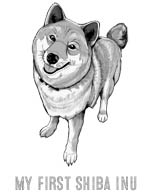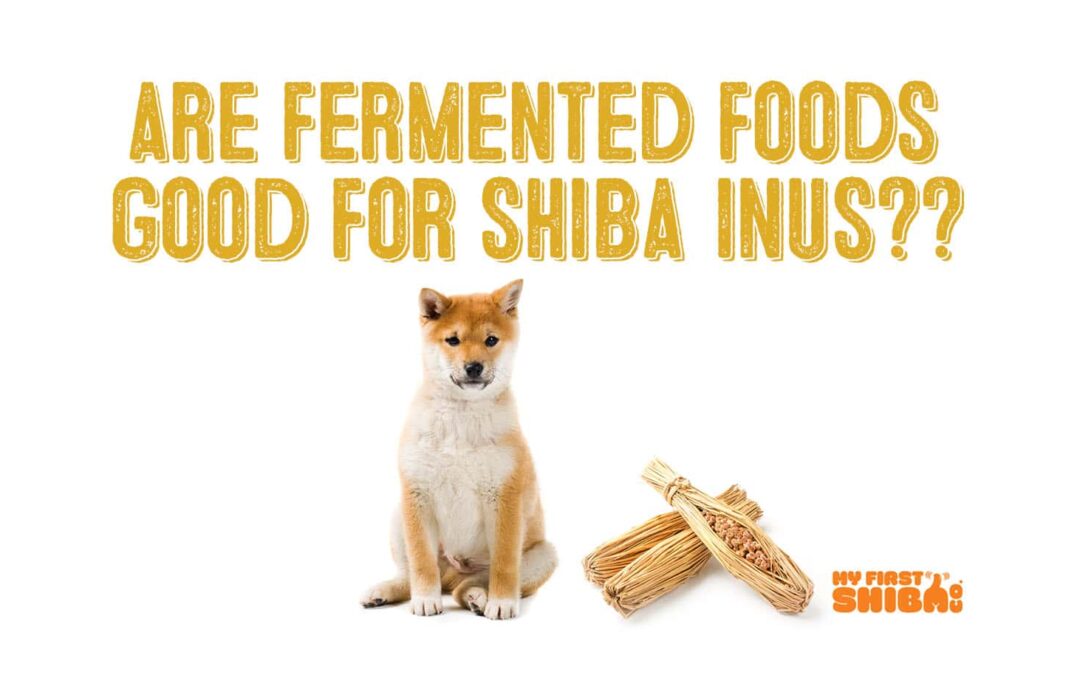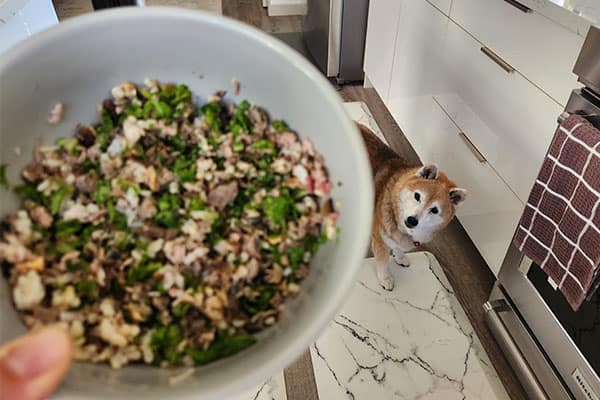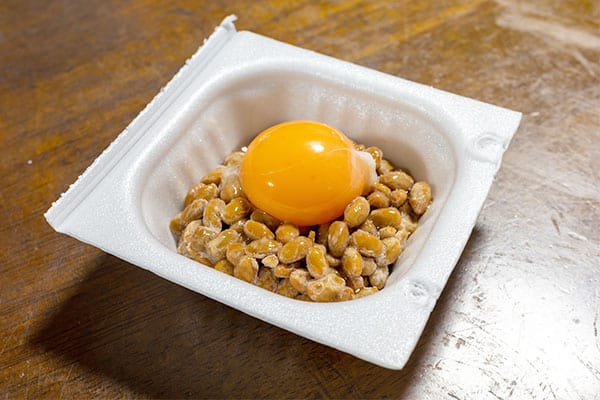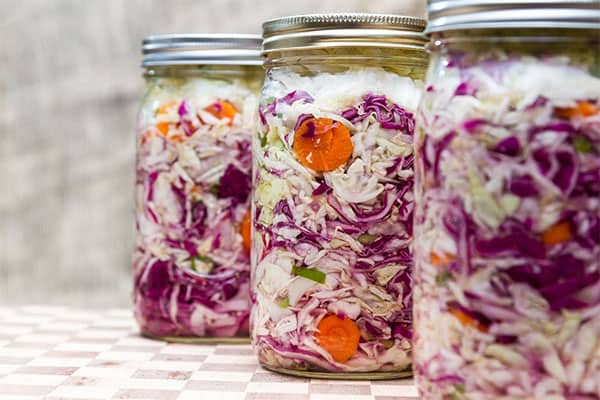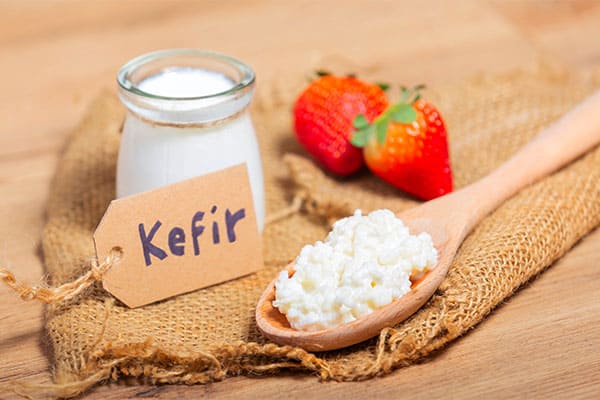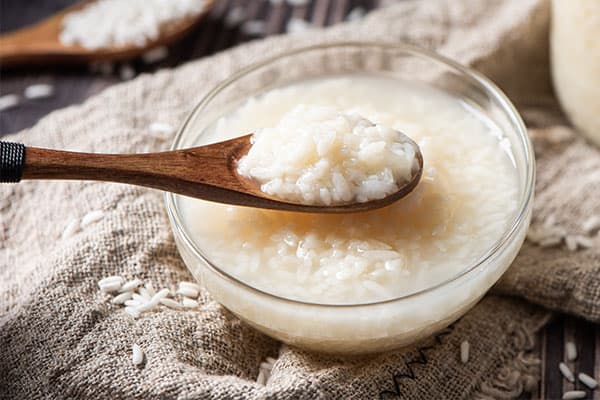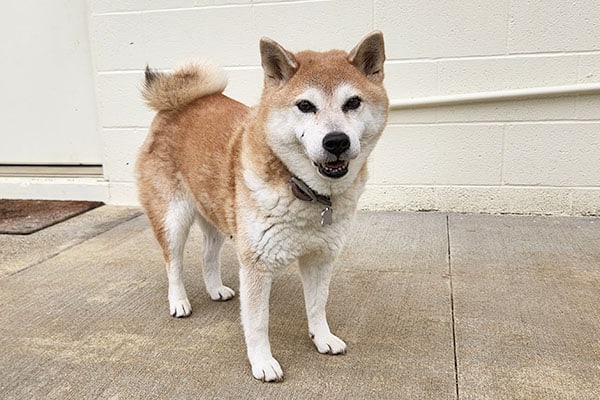On occasion, our posts contain affiliate links. However, we only recommend products that we truly believe in. For more information, visit my privacy policy page.
Author: Jennifer Tsukamoto
As devoted Shiba Inu owners, we’re always on the lookout for ways to enhance the health and wellbeing of our Shibas.
This post explores an often-overlooked food category that can make a significant difference in your Shiba’s diet: fermented foods.
Fermentation, an age-old process used to preserve and enhance the nutritional value of foods, isn’t just beneficial for humans.
Our canine family members can also reap substantial health benefits!
In this post, we’ll uncover the science behind fermentation, its impact on a dog’s digestive health, and how incorporating these nutrient-packed foods into your Shiba’s meals can boost their overall health and vitality.
What Exactly is Fermentation?
Simply put, fermentation is the process of microorganisms, like yeast and bacteria, breaking down carbohydrates.
The earliest record of humans using fermentation dates back 13,000 years!
In earlier times, fermentation was primarily used as a way of preserving foods.
People also discovered that fermentation can enhance flavor and provide potential health benefits.
You may have heard of some of the potential benefits of eating fermented foods.
But did you know that your Shiba Inu may get these same benefits from fermented foods, too?
What Are the Benefits of Feeding Dogs Fermented Foods?
A balanced gut microbiome is key to good gut health.
The microbiome are the organisms that live in the gut, including bacteria and fungi. Your dog’s gut, just like yours, can have gut bacteria — good and bad. It can also have good fungi and harmful fungi.
When the bad stuff starts to outnumber the good stuff, that’s when you’ll start to see problems.
In healthy dogs, fermented foods can help keep the microbiome in check.
That’s because fermented foods are rich in good bacteria. Maintaining a health gut microbiome is one of the top benefits of fermented foods, so here’s a little more on how they can help.
Immunity Boost –
Having a healthy gut microbiome can help support immunity, too.
We all want our Shibas to be strong and healthy. And just like us, dogs can be subject to any number of harmful bacteria and viruses.
A healthy immune system along with proper veterinary care is important for your dog to fight off infections or diseases.
Did you know that about 80% of the immune system is found in the gut?
Imbalances in the microbiota affect immune function.
Probiotic foods help keep the gut in balance. In short, a healthier gut supports immunity.
Feeding your dog fermented foods can help get your Shiba the probiotics needed to keep the gut microbiome balanced.
Better Digestion –
Some foods are easier to digest when they are fermented.
The fermentation process has already begun to break down carbohydrates. Carbs require more work for dogs to digest.
Eating fermented foods can help give your dog’s gut a break.
But carbs do have nutritional value, so there is a place for them in your dog’s diet.
By eating fermented foods, your dog can still take advantage of the nutritional upside of carbs while making digestion easier.
Better Absorption of Nutrients –
Another great benefit of fermented foods is better absorption of nutrients
Fermented products may also deactivate anti-nutrients.
Anti-nutrients are compounds like oxalates, lectins, and tannins.
Anti-nutrients like these are naturally occurring in some plant-based foods. This is part of the plant’s natural defense system against bacteria and insects.
However, when anti-nutrients are consumed by mammals, they can affect the absorption of essential nutrients and vitamins.
By neutralizing these anti-nutrients, your pup may get more of the good stuff found in his or her dinner.
Here’s more about what you need to know when it comes to feeding your dog fermented foods.
What Are the Best Fermented Foods for Dogs?
When it comes to fermented foods, there is an abundance to choose from!
When you introduce any new food to your Shiba, be sure to start slowly.
Every other day, you can add a teaspoon or less of the fermented food to your Shiba’s regular food.
Gradually increase the amount to about two teaspoons daily for small dogs. For larger Shibas, you can go up to a quarter cup.
Types of Fermented Foods Dogs Can Safely Consume:
Fermented Dairy
Your Shiba Inu may enjoy these fermented dairy products:
- Kefir (fermented drink made traditionally made with cow or goat milk)
- Yogurt
- Buttermilk
TIP: Fermented goat milk may be easier for your dog to digest than fermented cow milk. Some dogs have difficulty digesting lactose. Goat milk has lower levels of lactose.
When choosing fermented dairy products, avoid ones with high sugar content or artificial sweeteners.
Too much sugar can lead to health issues and weight gain. Not to mention tooth decay!
Artificial sweeteners can be toxic to dogs, so definitely avoid any product with those in it.
Fermented Vegetables
If a vegetable is considered safe for a dog, its fermented version should be ok, too. Here’s what to note about veggies.
- Not all “pickled” vegetables are fermented. Some are just preserved in vinegar. To get the fermentation benefits, make sure the veggies have been traditionally fermented.
- Always be aware of added ingredients. Some flavorings and spices are totally safe for humans but toxic to dogs. For example, a lot of sites say kimchi is ok for dogs. I have some reservations about it, though. Kimchi is a tasty food for humans. But kimchi often onions, and chili peppers which can be contraindicated in dogs.
Here are some safe fermented vegetables that your dog may enjoy:
- Fermented Beets
- Fermented Cucumbers
- Fermented Carrots
- Fermented Cabbage
- Fermented Zucchini
- Fermented Asparagus
- Fermented Green Beans
Fermented Meats
Fermented meats and fish are a little trickier.
The problem with the most readily available fermented meats is going to be the additives and spices.
They may contain artificial flavorings and chili peppers which are not ideal for dogs.
Any fermented meat you consider giving your dog should also NOT include sodium nitrates or nitrites as preservatives.
But if you can find a product without these ingredients, your dog may benefit and enjoy fermented treats on an occasional basis.
Fermented Grains and Seeds
When it comes to my Shibas’ diet, I like them to have some variety. They love getting special treats. I like to think it keeps things interesting for them.
But I also like them to get access to a variety of healthy foods, so they get a wide array of nutrients.
That means I do include some grains in their foods. There’s obviously a bunch of controversy about grains in a dog’s diet.
Personally, I do not believe it’s the grains that causes harm – but all the other preserved and processed ingredients typically found in “kibble”.
If grains are right for your Shibas, here are some great ferments to add to their regular diet.
Let’s start with fermented wheat germ.
Fermented Wheat Germ
Wheat germ is the part of the wheat berry that sprouts to grow into a new plant. It’s said to be the healthiest part of the wheat berry.
Wheat germ is a good source of omega-3 fatty acids which are good for your Shiba’s skin and coat.
Fermented wheat germ allows your pup to have all the benefits of wheat germ – vitamins, minerals, omega-3s, and fiber – and you get the added benefits of fermentation which you read about earlier.
Fermented Rice
Brown rice can enrich your dog’s diet by adding much needed fiber.
Fiber is important for healthy digestion. It can be helpful for dogs who have constipation or who strain to have a bowel movement.
Fiber can help regulate your dog’s bowels.
Better regulated bowels can also help avoid issues like anal gland inflammation in dogs.
Some dogs can get impacted anal glands that become hard like a walnut or golf ball. When this happens, the glands aren’t able to be expressed normally.
It can require a medical procedure to lance the glands to release what is inside.
Impacted anal glands can be very painful for your dog.
Fiber in the diet can go a long way to help prevent this painful condition so adding fiber-rich foods like fermented rice can be a great option for certain Shibas.
Fermented Pumpkin Seeds
Pumpkin seeds are safe for most dogs. They are a rich source of zinc, magnesium, and copper. These are all important minerals for your dog.
Like certain grains, pumpkin seeds are also high in fiber. You just read about some of the benefits a fiber can have for your dog.
Both the shell and the meat are edible. However for small dogs and voracious eaters, pumpkin seeds can be a choking hazard.
You can get around this by grinding them up in your food processor or high power blender, then sprinkle it in with your dog’s regular food.
Cons of Feeding Your Shiba Fermented Foods
There are a lot of pros to feeding your dog fermented foods.
But here are a couple reasons you mayt not want to jump right in with fermented foods before talking with your veterinarian.
For a lot of dogs, fermented foods can help maintain a healthy gut microbiome.
However, if your dog is dealing with gut issues, here’s what you’ll want to discuss with your vet before introducing fermented foods.
Candida
You may have heard that fermented foods contribute to an overgrowth of candida. Candida is a yeast (a type of fungi). If you’ve heard this, you may have been concerned.
An overgrowth of candida in dogs can lead to:
- Ear infections
- Excessive odor and smelly paws
- Excessive itching, biting, and licking
- Rashes
- Irritation of the eyes
- Coughing, sneezing and shortness of breath
And some fermented foods, like kombucha, can be tied to candida overgrowth.
(NOTE: Even in healthy dogs, kombucha is not recommended due to trace amounts of alcohol content.)
But not all fermented foods will contribute to problems. In fact, lacto-fermented vegetables and fruits are a powerful natural weapon that you can use against candida overgrowth!
Lacto-fermentation sounds complicated, but it just means that fermentation occurs when the lactobacillus bacteria digest the sugars in a food.
As the bacteria eat the sugar, lactic acid is created. This is what gives fermented foods their distinct taste.
Just be sure to talk to your vet to see if fermented foods are the right choice for your dog.
If your dog’s gut microbiome is out of balance, he or she may experience digestive discomfort.
Here are some signs that your pup’s gut microbiome may be out of balance.
- Gas
- Bloating
- Diarrhea
- Reduced immunity
- Lower tolerance for certain foods
Histamine Intolerance
Histamine intolerance happens when the body can’t break down histamine fast enough. This can happen to both people and dogs.
Histamine is a type of chemical that plays important roles in immunity, digestion, and even the sleep/wake cycle. It’s naturally made in the body.
This histamine adds to your dog’s overall histamine load. Certain foods can add to this load, too.
Think of it like a sink with a clogged drain. In this analogy, the histamine is the water coming from the faucet. If the drain works well, (the body’s ability to process histamine), there shouldn’t be too many problems, even if the faucet stays on.
But what if the drain is clogged?
The water won’t drain as fast as it’s coming in.
And eventually the sink will overflow. That’s when problems arise.
Histamine Intolerance in dogs can result in symptoms such as:
- Skin irritation
- Changes in fur/coat
- Gut issues
Fermented foods, as well as any aged foods, are higher histamine foods. If your dog has problems breaking down histamine, fermented foods may not be right for her/ him until the histamine load gets under control.
Food Additives
Commercially prepared ferments may contain ingredients that are safe for humans but harmful to dogs.
It’s best if your fermented food has minimal ingredients.
For example, with fermented veggies, it’s best if the ingredients are simply:
- Dog-safe vegetables
- Salt
- Water
In any fermented food you want to give your Shiba, avoid spices and flavorings that are toxic to dogs.
Additionally, avoid foods with added sugars and all artificial sweeteners.
Where To Buy Fermented Dog Foods, Treats, and Supplements?
Fermented Dog Treats
What Shiba Inu doesn’t get excited about special treats?
So why not give them something both tasty and healthy!
Steve’s real-food lamb-based treats are 80% meat, making them a great boost of protein.
These treats are fermented, so your Shiba will get all the benefits of fermentation too, including the pre, pro, and postbiotics needed to maintain a healthy gut!
These treats are great to have on hand.
Because this is a freeze-dried fermented food, you have shelf stability and can pack them up easily for on the go treats or easily crumble them up to mix in with your Shiba’s regular meals.
Fermented Dog Supplements
Dr. Mercola’s Organic Fermented Food Supplement
Dr. Mercola’s powder supplement is easy to incorporate into your dog’s diet. It’s made from fermented super foods like:
- Broccoli
- Beets
- Carrots
- Kale
- Seaweed
- Ginger
- Barley and Wheat Grasses
Organic Fermented Food for Cats and Dogs – 2.75 oz. – 1 Container (mercolamarket.com)
Fermented Dog Food
There aren’t a lot of options for commercially-available fermented dog foods.
Answer’s Pet Food offers fermented dog food in various formulas that can be purchased online and locally in most states.
However it’s important to remember that it’s not necessary to feed your Shiba a wholly-fermented food meal – supplementation with individually-fermented foods is more than enough!
Here’s to good health and good eats for you and your Shiba!!
Finding an Ethical Shiba Inu Breeder in California
Thanks for visiting Myfirstshiba.com! We do our very best in providing our readers with awesome content about our beloved Shiba Inu breed. Some of our articles include reviews and recommendations to our favorite products. We do occasionally earn commissions from certain affiliate links that help support our work and mission. Thanks again for visiting. Shiba Kisses To All!
